
Daviesia brevifolia, commonly known as leafless bitter-pea, is a species of flowering plant in the family Fabaceae and is endemic to the southern continental Australia. It is a broom-like shrub with short, cylindrical phyllodes and apricot to reddish-brown flowers.

Daviesia divaricata, commonly known as marno, is a species of flowering plant in the family Fabaceae and is endemic to the south-west of Western Australia. It is a low, spreading or erect and bushy shrub with phyllodes reduced to small, triangular scales, and orange and maroon flowers.

Daviesia buxifolia, commonly known as box-leaf bitter-pea, is a species of flowering plant in the family Fabaceae and is endemic to south-eastern continental Australia. It is an open shrub with egg-shaped to round phyllodes and yellow or yellowish-orange and maroon-brown flowers.
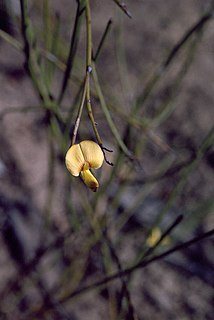
Daviesia anceps is a species of flowering plant in the family Fabaceae and is endemic to the south of Western Australia. It is a dense, erect or low-lying shrub with its branchlets reduced to flattened cladodes, and yellow flowers with red markings.
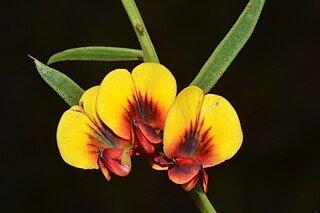
Daviesia angulata is a species of flowering plant in the family Fabaceae and is endemic to the south-west of Western Australia. It is an erect, spreading shrub with prickly, flattened phyllodes, and yellow flowers with red markings.

Daviesia apiculata is a species of flowering plant in the family Fabaceae and is endemic to the south-west of Western Australia. It is an erect, bushy shrub with scattered, erect phyllodes with a point on the end, and yellow flowers with a red tinge.

Daviesia arenaria, commonly known as sandhill bitter-pea, is a species of flowering plant in the family Fabaceae and is endemic to south-eastern continental Australia. It is usually a hummock-forming shrub with many short, spiny branchlets and heart-shaped to elliptic phyllodes with a sharp point on the end, and orange-pink, maroon and yellow flowers.
Daviesia audax is a species of flowering plant in the family Fabaceae and is endemic to the south-west of Western Australia. It is an erect shrub with scattered, erect, thick, rigid, sharply pointed phyllodes, and orange flowers with reddish-brown markings.
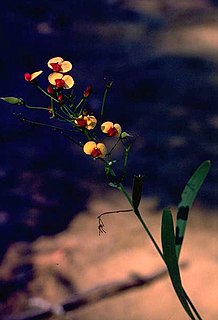
Daviesia costata is a species of flowering plant in the family Fabaceae and is endemic to the south-west of Western Australia. It is a straggling, multi-stemmed shrub with scattered, erect, linear phyllodes, and yellow and dark red flowers.

Daviesia crassa is a species of flowering plant in the family Fabaceae and is endemic to the south-west of Western Australia. It is a compact, dense, glabrous shrub with densely crowded, thick, club-shaped phyllodes, and uniformly yellow flowers.
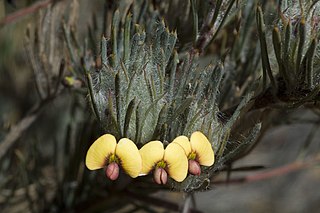
Daviesia croniniana is a species of flowering plant in the family Fabaceae and is endemic to the south-west of Western Australia. It is a compact, bushy shrub with hairy foliage, erect, broadly linear phyllodes and yellow or orange and reddish-brown flowers.

Daviesia daphnoides is a species of flowering plant in the family Fabaceae and is endemic to the south-west of Western Australia. It is a bushy or spreading shrub with glabrous foliage, sharply-pointed narrow elliptic to egg-shaped phyllodes with the narrower end towards the base and yellow and dark red flowers.

Daviesia decurrens, commonly known as prickly bitter-pea, is a species of flowering plant in the family Fabaceae and is endemic to the south-west of Western Australia. It is spreading, erect, or low-lying shrub with scattered, sharply-pointed, narrow triangular phyllodes, and yellowish pink and velvety red flowers.
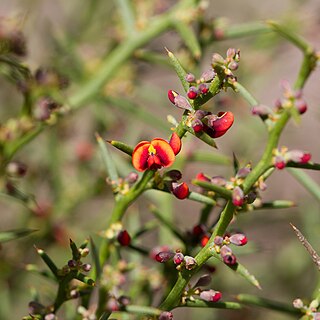
Daviesia devito is a species of flowering plant in the family Fabaceae is endemic to south-eastern continental Australia. It is a dense, prickly shrub with sharply-pointed phyllodes and yellow, red, greenish and maroon flowers. It was previously known as Daviesia benthamii subsp. humilis until that subspecies was split into two new species.
Daviesia schwarzenegger is a species of flowering plant in the family Fabaceae and is endemic to south-eastern continental Australia. It is a dense, mounded shrub with sharply-pointed phyllodes and yellow and dark red flowers, and resembles Daviesia devito apart from its more robust growth habit and the surface of its dried foliage.
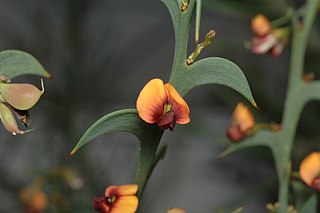
Daviesia dilatata is a species of flowering plant in the family Fabaceae and is endemic to the south-west of Western Australia. It is an erect, open, glabrous shrub with scattered, often sickle-shaped phyllodes, and orange, red, yellow and dark crimson flowers.

Daviesia dilatata is a species of flowering plant in the family Fabaceae and is endemic to Queensland. It is a glabrous, multi-stemmed shrub with linear, more or less sickle-shaped phyllodes, and yellow and dark red flowers.
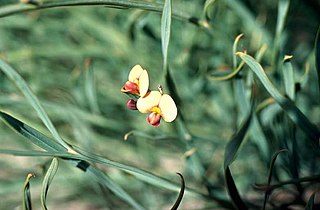
Daviesia elongata is a species of flowering plant in the family Fabaceae and is endemic to the south-west of Western Australia. It is a glabrous, spreading or sprawling shrub with narrowly egg-shaped to linear phyllodes and yellow-orange and maroon flowers.

Daviesia emarginata is a species of flowering plant in the family Fabaceae and is endemic to the south-west of Western Australia. It is an erect, mostly glabrous shrub with scattered egg-shaped phyllodes with the narrower end towards the base and with a notch at the tip, and yellow and pink flowers.
Daviesia eremaea is a species of flowering plant in the family Fabaceae and is endemic to central Australia. It is an erect, glabrous, multi-stemmed shrub with needle-like, more or less sharply-pointed phyllodes, and yellow and red flowers.

















